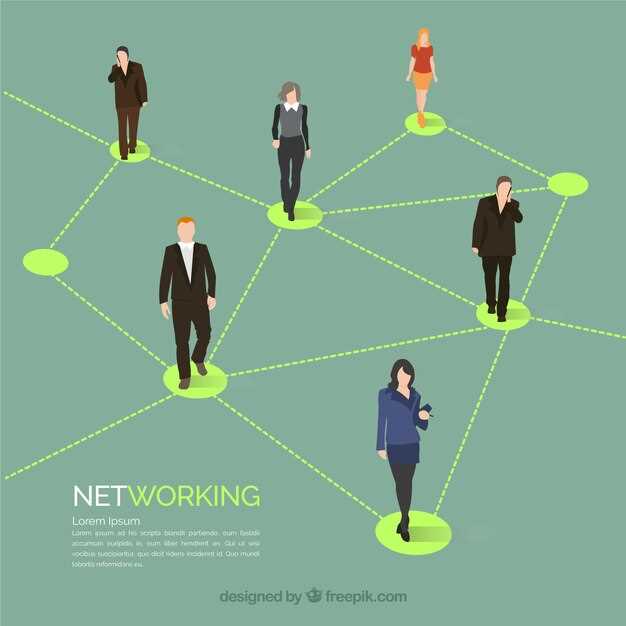
Human beings are inherently social creatures, constantly seeking connections and interactions with others. These connections, whether personal or professional, play a vital role in shaping our lives and opening doors to new opportunities. In today’s fast-paced and interconnected world, the ability to network effectively has become an essential skill for success.
Networking is more than just exchanging business cards or attending events; it is an art form that requires genuine effort and intentionality. It involves building meaningful relationships based on trust, mutual respect, and shared interests. By nurturing these connections, individuals can create a network of like-minded individuals who can offer support, guidance, and valuable insights.
Successful networking goes beyond simply expanding one’s circle of acquaintances; it is about cultivating authentic relationships that go beyond surface-level interactions. It is about finding common ground, understanding each other’s passions and goals, and creating a sense of camaraderie. These connections can serve as a source of inspiration, motivation, and even collaboration, leading to personal and professional growth.
Networking is not limited to a specific industry or profession; it is a universal skill that can benefit individuals from all walks of life. Whether you are an entrepreneur looking to expand your business, a student seeking mentorship, or a professional aiming to advance your career, networking can provide you with the necessary support and resources to achieve your goals.
So, how can one master the art of networking? It starts with being genuine and authentic in your interactions. Instead of focusing solely on what you can gain from a connection, approach networking with a mindset of giving and adding value to others. Actively listen, show empathy, and be genuinely interested in the stories and experiences of those you meet. By doing so, you will create a lasting impression and build a network of individuals who genuinely care about your success.
The Power of Networking: Why It Matters for Personal and Professional Success
Networking is a vital component of achieving personal and professional success. It serves as a catalyst for growth, enabling individuals to forge valuable connections and unlock countless opportunities. By actively engaging in networking activities, individuals can expand their knowledge, gain access to resources, and establish meaningful relationships that can propel them forward in their personal and professional lives.
Building a Strong Support System
Networking allows individuals to build a strong support system that can provide guidance, advice, and assistance when needed. By connecting with like-minded individuals, professionals can tap into a wealth of knowledge and experience, gaining insights and perspectives that can help them overcome challenges and make informed decisions. This support system acts as a safety net, offering encouragement and motivation during times of uncertainty or setbacks.
Expanding Opportunities

Networking opens doors to a world of opportunities that may not be readily available through traditional means. By establishing connections with individuals from diverse backgrounds and industries, professionals can gain access to new ideas, collaborations, and potential partnerships. These opportunities can lead to career advancements, business growth, and personal development, ultimately contributing to long-term success.
In conclusion, networking plays a pivotal role in personal and professional success. It provides individuals with the means to build a strong support system and expand their opportunities. By actively engaging in networking activities, individuals can harness the power of connections to propel themselves forward, unlocking new possibilities and achieving their goals.
Building Your Network: Strategies for Expanding Your Connections
Expanding your network and forging new connections is a crucial aspect of personal and professional growth. By actively seeking out opportunities to meet new people and engage in meaningful conversations, you can create a diverse and valuable network that can open doors to various opportunities.
One effective strategy for expanding your connections is to attend industry events and conferences. These gatherings provide a platform for like-minded individuals to come together, exchange ideas, and establish new connections. By actively participating in discussions and networking sessions, you can meet professionals from different backgrounds and industries, broadening your network and gaining valuable insights.
Another strategy is to leverage social media platforms. In today’s digital age, social media has become a powerful tool for networking. By actively engaging with industry influencers and thought leaders on platforms such as LinkedIn and Twitter, you can establish connections with individuals who share similar interests and goals. Additionally, joining relevant online communities and participating in discussions can help you expand your network beyond geographical boundaries.
Volunteering and giving back to your community is another effective way to expand your network. By getting involved in charitable organizations or community initiatives, you can meet individuals who are passionate about similar causes. These connections can not only provide you with a sense of fulfillment but also open doors to new opportunities and collaborations.
Lastly, maintaining and nurturing existing connections is crucial for expanding your network. Regularly reaching out to your contacts, whether through emails, phone calls, or in-person meetings, shows that you value the relationship. By staying connected and offering support whenever possible, you can strengthen your network and potentially receive referrals or introductions to new connections.
Expanding your network requires effort and a proactive approach. By implementing these strategies and consistently seeking out new opportunities to connect with others, you can build a robust network that will contribute to your personal and professional growth.
Nurturing Relationships: How to Maintain and Strengthen Your Network
In the realm of fostering connections and expanding your network, it is essential to understand the significance of nurturing relationships. Building and maintaining meaningful connections is a vital aspect of personal and professional growth. This section will delve into effective strategies for cultivating and strengthening your network, ensuring its longevity and value.
1. Prioritize Regular Communication:
- Engage in frequent and meaningful conversations with your network contacts.
- Utilize various communication channels such as email, phone calls, and social media platforms.
- Stay updated on their professional endeavors and personal milestones.
2. Offer Support and Assistance:
- Show genuine interest in the success and well-being of your network connections.
- Provide assistance whenever possible, whether it’s sharing resources, offering advice, or making introductions.
- Be proactive in identifying opportunities to help and support them.
3. Attend Networking Events and Conferences:
- Participate in industry-specific gatherings and conferences to meet new individuals and strengthen existing relationships.
- Take advantage of networking events to exchange ideas, collaborate, and expand your network.
- Follow up with new contacts after the event to maintain the connection.
4. Show Gratitude and Appreciation:
- Express gratitude for the support and guidance received from your network.
- Send personalized thank-you notes or emails to show appreciation for their contributions.
- Recognize their achievements publicly and endorse their skills and expertise.
5. Be a Resource for Others:
- Offer your knowledge, skills, and resources to help others in your network.
- Share valuable information, articles, or industry insights that may benefit them.
- Actively connect individuals within your network who could benefit from collaborating or working together.
By consistently nurturing relationships within your network, you can create a supportive and mutually beneficial community. Remember, building meaningful connections is an ongoing process that requires effort, sincerity, and a genuine desire to help others succeed.
Networking Etiquette: Dos and Don’ts for Making a Positive Impression
Mastering the art of building meaningful connections is not just about making contacts, but also about understanding the proper etiquette that can leave a lasting positive impression. In this section, we will explore the dos and don’ts of networking etiquette, providing you with valuable insights on how to navigate social and professional situations with finesse.
1. Do: Be genuine and authentic. When networking, it is important to be yourself and show genuine interest in others. Authenticity builds trust and fosters meaningful connections that can lead to personal and professional growth.
2. Don’t: Oversell yourself. While it is important to highlight your skills and accomplishments, avoid coming across as arrogant or self-centered. Instead, focus on building mutually beneficial relationships by listening attentively and offering support to others.
3. Do: Dress appropriately. Your appearance plays a significant role in making a positive impression. Dress professionally and according to the occasion, showing respect for the event and the people you are networking with.
4. Don’t: Forget to follow up. After networking events or meetings, it is crucial to follow up with the individuals you connected with. Send personalized messages expressing your gratitude and interest in maintaining the relationship, and be proactive in scheduling future interactions.
5. Do: Practice active listening. Engage in meaningful conversations by actively listening to others. Show genuine interest, ask thoughtful questions, and provide meaningful input. This demonstrates respect and helps establish a strong foundation for future connections.
6. Don’t: Be overly aggressive. While it is important to be proactive in networking, avoid being pushy or overly aggressive in your approach. Respect personal boundaries and allow relationships to develop naturally over time.
7. Do: Be prepared. Before attending networking events or meetings, do your research and come prepared with relevant information and conversation topics. This shows professionalism and allows for more meaningful and engaging conversations.
8. Don’t: Neglect your online presence. In today’s digital age, maintaining a professional online presence is essential. Regularly update your social media profiles, connect with industry professionals, and engage in online discussions to expand your network and showcase your expertise.
By following these dos and don’ts of networking etiquette, you can make a positive impression and build meaningful connections that can contribute to your personal and professional growth. Remember, networking is not just about collecting business cards, but about nurturing relationships based on mutual respect and support.
Leveraging Your Network: Using Connections to Advance Your Career

In today’s interconnected world, the power of networking cannot be underestimated. By cultivating and leveraging your network of professional connections, you can propel your career to new heights and open doors to exciting opportunities. Harnessing the potential of your network is not just about making small talk at events or collecting business cards; it’s about strategically utilizing your relationships to advance your career and achieve your goals.
When it comes to leveraging your network, it’s essential to approach it with intention and purpose. Building meaningful connections is not just about the quantity of contacts you have, but the quality of those relationships. It’s about nurturing genuine connections with individuals who share your professional interests, values, and aspirations. These connections can serve as valuable resources, providing insights, advice, and support as you navigate your career path.
One of the key ways to leverage your network is by seeking out mentors and advisors who can offer guidance and expertise. These individuals can provide valuable insights based on their own experiences and help you navigate challenges and make informed decisions. By establishing a mentorship relationship, you can tap into their knowledge and leverage their connections to expand your own network.
Another effective way to leverage your network is by actively participating in professional communities and industry events. By attending conferences, seminars, and workshops, you can connect with like-minded professionals and experts in your field. Engaging in these communities not only allows you to stay updated on industry trends and developments but also provides opportunities for collaboration, partnerships, and career advancement.
Additionally, leveraging your network involves reciprocity and giving back. It’s not just about what you can gain from your connections but also what you can offer in return. By being a resource and providing support to others in your network, you strengthen those relationships and build a reputation as a valuable and reliable professional. This reciprocity can lead to new opportunities, referrals, and recommendations that can propel your career forward.
In conclusion, leveraging your network is a powerful tool for advancing your career. By cultivating genuine connections, seeking mentorship, actively participating in professional communities, and practicing reciprocity, you can tap into the collective knowledge, experience, and opportunities that your network has to offer. Remember, it’s not just about who you know, but how you strategically utilize those connections to achieve your professional goals.
Networking in the Digital Age: Tips for Building an Online Presence and Connecting Virtually
In today’s digital era, establishing a strong online presence and effectively connecting with others virtually has become essential for personal and professional growth. With the advancement of technology, networking has evolved beyond traditional face-to-face interactions, allowing individuals to expand their reach and build meaningful connections in the online world.
When it comes to building an online presence, it is crucial to curate a professional image that accurately represents your skills, expertise, and interests. Start by creating a compelling and well-structured online profile on platforms such as LinkedIn or professional websites. Highlight your achievements, showcase your portfolio or work samples, and use engaging language to captivate potential connections.
Engagement is key in the digital networking realm. Actively participate in online communities, forums, and discussion groups related to your field of interest. Share your insights, ask thoughtful questions, and provide valuable feedback to establish yourself as a knowledgeable and reliable resource. This will not only help you gain visibility but also attract like-minded individuals who share similar interests and goals.
Another effective way to build an online presence is by creating and sharing relevant content. Start a blog or contribute articles to industry-specific websites to showcase your expertise and establish yourself as a thought leader. Share your content on social media platforms, leveraging hashtags and engaging with your audience to spark conversations and expand your network.
Virtual networking events and webinars have become increasingly popular, providing opportunities to connect with professionals from around the world. Take advantage of these platforms to attend virtual conferences, workshops, and seminars. Engage in meaningful conversations, ask questions, and follow up with new connections afterward to nurture and strengthen your relationships.
Remember, building an online presence and connecting virtually requires consistent effort and active engagement. Regularly update your profiles, share valuable content, and interact with your network to stay relevant and visible. By leveraging the power of the digital age, you can expand your reach, establish meaningful connections, and unlock new opportunities for personal and professional growth.